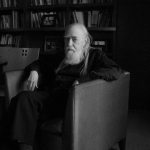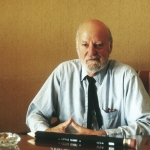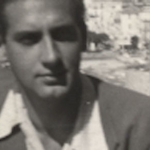1
ultimate boundary: arms
stretched
sideways to represent
nothing
supreme
accomplishment: ends
of the earth
2
I will forget
first what
happened, then
ideas
then all my
feelings, forgetting
finally what I’m
up to now
pose
accept
almost some expiring
embers signifying
momentary joy
3
and a bare knife also
figures
4
amnesia retrograde and
anterograde—unable
to acquire new
information and the
old store lost
blessed are the feet
finite on this
unfinished page
defy
conquer
divine denominations de-
rived from prepositions
equivalent to
end, the sky
wears out as well
5
earth’s limit against the
soles, bordering
air, but my toes
point
come to the world’s con-
clusion, distinguishing
infinity from
the boundless
a figure of death in
the plural of majesty
a bronze vase, as
vessel for nothing
burnt flesh
figured
by the living animal
the “name, address
and flower” test
images of weeping
friends, signifying
weeping
6
immaterial
mystery, imperfect
misery
I start at the
coast, my
limit the
shore opposite
not movement mere
direction
7
mist dancing
8
ocean’s music
9
an ornamental barrier or
parapet along the
edge of
this terrace, this
balcony, this etc.
inconceivable splendour
signifying a choice
of evils
nameless objects
seen imperfectly by
the flame from sticks
a nearer though still im-
perfect view
back to past ages
watery track . . .
10
. . . Isle of the Dead
11
stranger both to
model and to
copy
unable to relate
the garment to the body
absolute border: surface
and line and
point, alien to all
experience
weaving a sound over the
water, not to
harbor there but
to surpass the port
12
objects of regret in
a mysterious
accent
I will forget all my
words, first
proper names, then common
nouns
adjectives next
next interjections and
at last (even)
gestures
obscurity of the dawn
signifying
love of self
13
on a page of
sand, appearance
of a footprint
14
I heard the
speech of one
unknown to me
the report dying
gradually away
I heard
a voice I
had not known
the righteous lifted
up, while we
remain suspended
I can hear a
voice I no
longer recognize
a sort of tear, symbol
of poured wine or else
the splash of the wine poured
he caused him to
hear
a tongue which he
knew not
15
he temple figured by
a frame, inlet to the
sanctuary, narrow pass
between columns
then a track
leading across and
beyond
the balustrade
this room and a
skein, succession
of generations, some
kind of existence
16
the spin
begins to wobble
the bare
surface where earth
meets air and becomes
horizon
17
to remember you, as Aristotle
would insist, is not to
recall you
not clever or quick
enough for
recollection
but in the slow
turn of
attention, I do
bring you back, which
does not mean I know you
a picture
18
two eyes, or one
triangle—sight
in abstracto
19
uncertain of
the way
20
thrown
21
I will forget
to appreciate
Klee, Tristam
Shandy, Emma
Kirkby
then
forget how to
do what-
ever
finally forget
anger and finally
fear
common noise, a common
languor, uncanny and
pensive silence







Comment form: